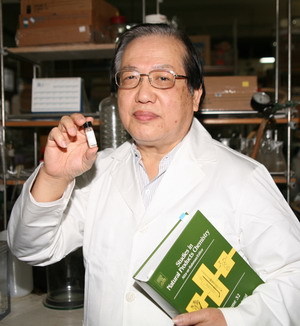NCKU Faculty Develop Potent Anticancer Prodrug

Tainan, TAIWAN, Dec.2, 2008---Under the rising threat from deadly disease, cancer, Taiwan is faced with the rigorous challenges to develop new drugs or treatment strategy for curing cancers. Professor Tian-Shung Wu (吳天賞) of the Department of Chemistry of National Cheng Kung University (NCKU) has successfully isolated and synthesized a potent antineoplastic prodrug, antofine, by making use of organic chemistry to synthesize various phenanthroindolizidine alkaloids. Antofine is one of these alkaloids isolated from Cryptocarya chinensis and Ficus septica.
Antofine, isolated and synthesized by Professor Wu through three key steps, viz. oxidative coupling reaction, electrocyclic reaction and radical cyclization, is experimented and screened against four human tumor cell lines, including A549 (lung), MCF-7 (breast), KB (nasopharyngeal) and KB-VIN (multidrug-resistant KB subline).
Professor Wu said that owing to the lately technological achievement and changes with each passing day, new drugs and treatment methods of curing the cancer are been continuously developed. “Merging various drugs can often produce good short-date treatment, but most only can give slow benefit. The treatment strategy is to use drugs to kill or decelerate the growth of cancer cell. These drugs are called cell toxin (cytotoxic agent). Until now, the drugs seldom reach the completely result of curing the cancer, so scientists continuously try to look for lately anti-cancer medicine,” Professor Wu added.
Professor Tian-Shung Wu, studying the Chinese herb medicines for more than 30 years, has devoted himself to the study of isolation and biological activity on them. When Professor Wu hosted the national project of the National Science and Technology Program for Biotechnology and Pharmaceuticals (NSTPBP), through bioassay-guided isolation of active principles in pure form, his research team has provided many discoveries and information on phenanthroindolizidine type alkaloids. So far, there are more than 60 kinds of phenanthroindolizidines and phenathroquinolizidines reported from the literature. They exhibit various biological effects, including anti-inflammation, anti-leukemia, anti-microorganism, antitumor, anti-dysentery, anti-vascular endothelial growth, anti-insect, antibacterial, antifungal, inhibition of protein synthesis, etc.
Professor Tian-Shung Wu, currently Distinguished Professor of NCKU, was director of National Research Institute of Chinese Medicine before he was appointed as director of Department of Chemistry of NCKU.
Professor Wu’s research interests are focus on isolation, structure elucidation, structure modification and synthesis of bioactive natural products, organic chemistry, instrumental analysis, medicinal chemistry and pharmacognosy. He got research rewards for successive 8 years from National Science Council. He also was the recipient of “Outstanding Medical Technology” award from Yung Shin Tien Te Lee Foundation in 2006 as well as “Distinguished Scholar Award of KT Li” in 2007.
Antofine, isolated and synthesized by Professor Wu through three key steps, viz. oxidative coupling reaction, electrocyclic reaction and radical cyclization, is experimented and screened against four human tumor cell lines, including A549 (lung), MCF-7 (breast), KB (nasopharyngeal) and KB-VIN (multidrug-resistant KB subline).
Professor Wu said that owing to the lately technological achievement and changes with each passing day, new drugs and treatment methods of curing the cancer are been continuously developed. “Merging various drugs can often produce good short-date treatment, but most only can give slow benefit. The treatment strategy is to use drugs to kill or decelerate the growth of cancer cell. These drugs are called cell toxin (cytotoxic agent). Until now, the drugs seldom reach the completely result of curing the cancer, so scientists continuously try to look for lately anti-cancer medicine,” Professor Wu added.
Professor Tian-Shung Wu, studying the Chinese herb medicines for more than 30 years, has devoted himself to the study of isolation and biological activity on them. When Professor Wu hosted the national project of the National Science and Technology Program for Biotechnology and Pharmaceuticals (NSTPBP), through bioassay-guided isolation of active principles in pure form, his research team has provided many discoveries and information on phenanthroindolizidine type alkaloids. So far, there are more than 60 kinds of phenanthroindolizidines and phenathroquinolizidines reported from the literature. They exhibit various biological effects, including anti-inflammation, anti-leukemia, anti-microorganism, antitumor, anti-dysentery, anti-vascular endothelial growth, anti-insect, antibacterial, antifungal, inhibition of protein synthesis, etc.
Professor Tian-Shung Wu, currently Distinguished Professor of NCKU, was director of National Research Institute of Chinese Medicine before he was appointed as director of Department of Chemistry of NCKU.
Professor Wu’s research interests are focus on isolation, structure elucidation, structure modification and synthesis of bioactive natural products, organic chemistry, instrumental analysis, medicinal chemistry and pharmacognosy. He got research rewards for successive 8 years from National Science Council. He also was the recipient of “Outstanding Medical Technology” award from Yung Shin Tien Te Lee Foundation in 2006 as well as “Distinguished Scholar Award of KT Li” in 2007.
Provider:
新聞中心
Date:
2008-12-03



